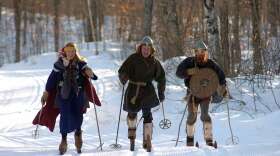Lake Effect has covered several stories on the farm-to-table, or locavore movement, at restaurants and among some consumers. But when it comes to your weekly grocery shopping, how much of it involves support for local agriculture?
The view from two Wisconsin farmers: not enough.
"Farmers aren’t making money, and so we’re not attracting new farmers into the business. And I think the public seems to be falling farther and farther away from where their food is produced, and so it’s a parallel crisis, if you will," says farming contributor Dave Kozlowski of Pinehold Gardens in Oak Creek.
Kirsten Jurcek, president of the Southeast Chapter of the Wisconsin Farmers Union and cattle farmer at Brattset Family Farm, adds, "As we have less and less small farms, we have less and less people that are associated with the farm, and it's a sort of downward spiraling association. And so farm consolidation is happening faster and faster in the state of Wisconsin and all over the country."
Among dairy farms in Wisconsin, the numbers are striking. The state topped out at 167,000 in 1940 and now has just 9,000. The U.S. Department of Agriculture notes the percentage of small farms has dropped from 46 percent to 25 percent of the total since 1991 — but is there an antidote to that trend?
Jurcek notes that approximately 60-65 percent of all of our food comes from 3 percent large farms, an "eye-opening" number.
Kozlowski says part of the problem with our food culture is the industrialized process of the food supply. "[We've] made it so much cheaper and convenient for people to buy things packaged and processed than to actually cook it at home," he says, "[and] globally we're sort of homogenizing our food cultures, which is a shame."
Tips To Help Offset Food Consolidation In Everyday Life
So, what can you do to help offset food consolidation in your everyday life? Kozlowski and Jurcek offer a few helpful tips:
Buy Local Products At Your Major Grocery Stores
Kozlowski notes that more chain grocery stores in Wisconsin are buying and highlighting local food suppliers. Not only is it good for farmers, but it's good marketing and community relations, he says.
"I say it's a tiny bright spot because it's raising some awareness that food actually does comes from a farm. It just doesn't arrive in your grocery basket in a Styrofoam, shrink-wrapped package," he says.
Eat At Restaurants That Source Local Ingredients
"Restaurant chefs have recognized the fact that local food not only tastes better, but their clientele are demanding it," says Kozlowski.
Cook More
Jurcek says, "Cooking isn't hard to do. It's not really a hard thing to learn, and it's a wonderful thing to do. It's enjoyable. It's wonderful family time — it's just quality time."
Kozlowski adds that local food is not necessarily more expensive. In fact, in buying healthful, whole foods and cooking them yourself, your grocery bill will only have about a $1.50 difference a week, according to Jurcek.
Kozlowski says if people cook more, they will be more invested in where their food comes from and foster a sense of pride. "I think we can get that sort of sense of cultural love for our food again if we're cooking it, if we're in the kitchen working with it."
Shop At Farmers Markets
With farmers markets happening most weekends (even in the winter), seeing the seasonal produce and learning how to utilize it is a great way to learn more about where your food comes from. Many farmers also offer a Community Supported Agriculture program (CSA) that can offer newsletters, recipes and foster a relationship with the community, according to Kozlowski.
"I think farmers markets are a great connection with the farmer, the food and the cooking because oftentimes we put things out at the market [people] don't know what to do with — and they'll ask us," he says.
The Urban Ecology Center is hosting a Local Farmer Open House on March 9, where you can meet the farmers, attend workshops, find information about buying directly from farmers, and show the wide variety of CSAs available in southeastern Wisconsin.
"These are baby steps, but if we just keep making them, eventually we can turn this food culture around — I'm sure of it," says Kozlowski.







